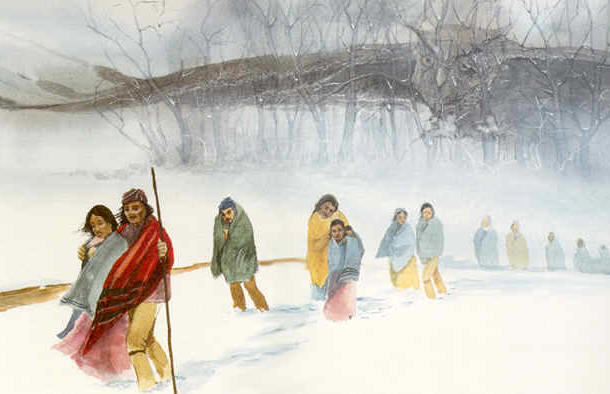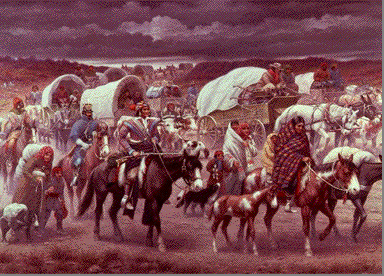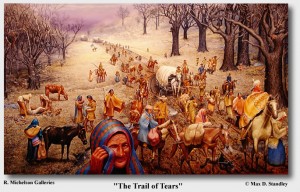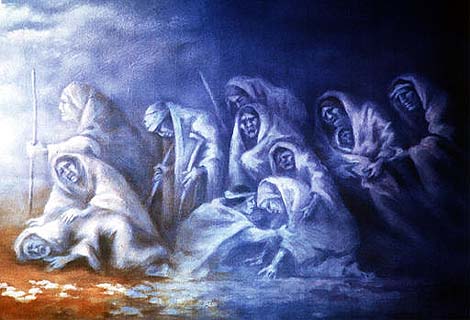In the wow, just wow category, Bryan Fischer continued his supremacist ways by stating that constitutional guarantees of freedom of religion applies only to Christians. To wit:
Islam has no fundamental First Amendment claims, for the simple reason that it was not written to protect the religion of Islam. Islam is entitled only to the religious liberty we extend to it out of courtesy. While there certainly ought to be a presumption of religious liberty for non-Christian religious traditions in America, the Founders were not writing a suicide pact when they wrote the First Amendment.
To bolster his claim, Fischer quotes Supreme Court Justice Joseph Story out of context:
“Probably at the time of the adoption of the constitution, and of the amendment to it, now under consideration, the general, if not the universal, sentiment in America was, that Christianity ought to receive encouragement from the state, so far as was not incompatible with the private rights of conscience, and the freedom of religious worship. An attempt to level all religions, and to make it a matter of state policy to hold all in utter indifference, would have created universal disapprobation, if not universal indignation…
“The real object of the amendment was, not to countenance, much less to advance Mahometanism, or Judaism, or infidelity, by prostrating Christianity; but to exclude all rivalry among Christian sects, and to prevent any national ecclesiastical establishment, which should give to an hierarchy the exclusive patronage of the national government.”
Story, writing as a constitutional historian, is quite clear. The purpose of the First Amendment was not “to advance Mohametanism” but to “exclude all rivalry among Christian sects.”
However, a elsewhere in the same book, Commentaries on the Constitution of the United States (1833), Story wrote:
It was under a solemn consciousness of the dangers from ecclesiastical ambition, the bigotry of spiritual pride, and the intolerance of sects, thus exemplified in our domestic, as well as in foreign annals, that it was deemed advisable to exclude from the national government all power to act upon the subject. The situation, too, of the different states equally proclaimed the policy, as well as the necessity of such an exclusion. In some of the states episcopalians constituted the predominant sect; in other presbyterians; in others, congregationalists; in other, quakers; in others again, there was close numerical rivalry among contending sects. It was impossible, that there should not arise perpetual strife and perpetual jealousy on the subject of ecclesiastical ascendancy, if the national government were left free to create a religious establishment. The only security was in extirpating the power. But this alone would have been an imperfect security, if it has not been followed up by a declaration of the right of the free exercise of religion, and a prohibition (as we have seen) of all religious tests. Thus, the whole power over the subject of religion is left exclusively to the state governments, to be acted upon according to their own sense of justice, and the state constitutions; and the Catholic and Protestant, the Calvinist and the Arminian, the Jew and the Infidel, may sit down at the common table of the national councils, without any inquisition into their faith, or mode of worship. (596-597)
Justice Story said correctly that most people in the early nation were Christian of one stripe or another. The common understanding was the state would advance Christianity, but Story’s argument, if read in context, was that the United States would be different. In matters of national business, there was not to be a religious test, no inquiry about allegiances to a particular religious view.
Elsewhere in his book, Story writes about the religious tests in England for those pursuing public office. Candidates had to demonstrate allegiance to the Church of England via statements from clergy and involvement in religious ceremony. Such tests according to Story, were designed to keep out “non-conformists of all denominations, infidels, Turks, Jews, heretics, papists, and sectaries…” However, the First Amendment stood against the formation of such tests in the new nation.
Story’s real argument is for a government which respected the individual conscience, saying that the “rights of conscience are, indeed, beyond the just reach of any human power.” (p. 727). Reading the relevant sections, it becomes clear that Fischer has pulled out a section out of the context of Story’s eloquent tribute to freedom of conscience that is the First Amendment.
As an addition to this post, I want to include a lengthy section of Joseph Story’s writing (free on Google books) on religious tests for involvement in public life. Story is commenting specifically on Article VI, paragraph 3 of the Constitution:
The Senators and Representatives before mentioned, and the Members of the several State Legislatures, and all executive and judicial Officers, both of the United States and of the several States, shall be bound by Oath or Affirmation, to support this Constitution; but no religious test shall ever be required as a qualification to any office or public trust under the United States.
Although primarily influenced by Christianity, the founders did not want state limitations on conscience and made that explicit. Story’s commentary blasts religious bigotry and supremacy and should be heeded by those on the Christian right who want to limit the religious freedom of others.
1841. The remaining part of the clause declares, that “no religious test shall ever be required, as a “qualification to any office or public trust, under the “United States.” This clause is not introduced merely for the purpose of satisfying the scruples of many respectable persons, who feel an invincible repugnance to any religious test, or affirmation. It had a higher object; to cut off for ever every pretence of any alliance between church and state in the national government. The framers of the constitution were fully sensible of the dangers from this source, marked out in the history of other ages and countries ,- and not wholly unknown to our own. They knew, that bigotry was unceasingly vigilant in its stratagems, to secure to itself an exclusive ascendancy over the human mind; and that intolerance was ever ready to arm itself with all the terrors of the civil power to exterminate those, who doubted its dogmas, or resisted its infallibility.
The Catholic and the Protestant had alternately waged the most ferocious and unrelenting warfare on each other; and Protestantism itself, at the very moment, that it was proclaiming the right of private judgment, prescribed boundaries to that right, beyond which if any one dared to pass, he must seal his rashness with the blood of martyrdom. The history of the parent country, too, could not fail to instruct them in the uses, and the abuses of religious tests. They there found the pains and penalties of non-conformity written in no equivocal language, and enforced with a stern and vindictive jealousy.
One hardly knows, how to repress the sentiments of strong indignation, in reading the cool vindication of the laws of England on this subject, (now, happily, for the most part abolished by recent enactments,) by Mr. Justice Blackstone, a man, in many respects distinguished for habitual moderation, and a deep sense of justice. “The second species,” says he “of non-conformists, are those, who offend through a mistaken or perverse zeal. Such were esteemed by our laws, enacted since the time of the reformation, to be papists, and protestant dissenters; both of which were supposed to be equally schismatics in not communicating with the national church; with this difference, that the papists divided from it upon material, though erroneous, reasons; but many of the dissenters, upon matters of indifference, or, in other words, upon no reason at all. Yet certainly our ancestors were mistaken in their plans of compulsion and intolerance. The sin of schism, as such, is by no means the object of temporal coercion and punishment. If, through weakness of intellect, through misdirected piety, through perverseness and acerbity of temper, or, (which is often the case,) through a prospect of secular advantage in herding with a party, men quarrel with the ecclesiastical establishment, the civil magistrate has nothing to do with it; unless their tenets and practice are such, as threaten ruin or disturbance to the state. He is bound, indeed, to protect the established church; and, if this can be better effected, by admitting none but its genuine members to offices of trust and emolument, he is certainly at liberty so to do; the disposal of offices being matter of favour and discretion. But, this point being once secured, all persecution for diversity of opinions, however ridiculous or. absurd they may be, is contrary to every principle of sound policy and civil freedom. The names and subordination of the clergy, the posture of devotion, the materials and colour of the minister’s garment, the joining in a known, or an unknown form of prayer, and other matters of the same kind, must be left to the option of every man’s private judgment.”



